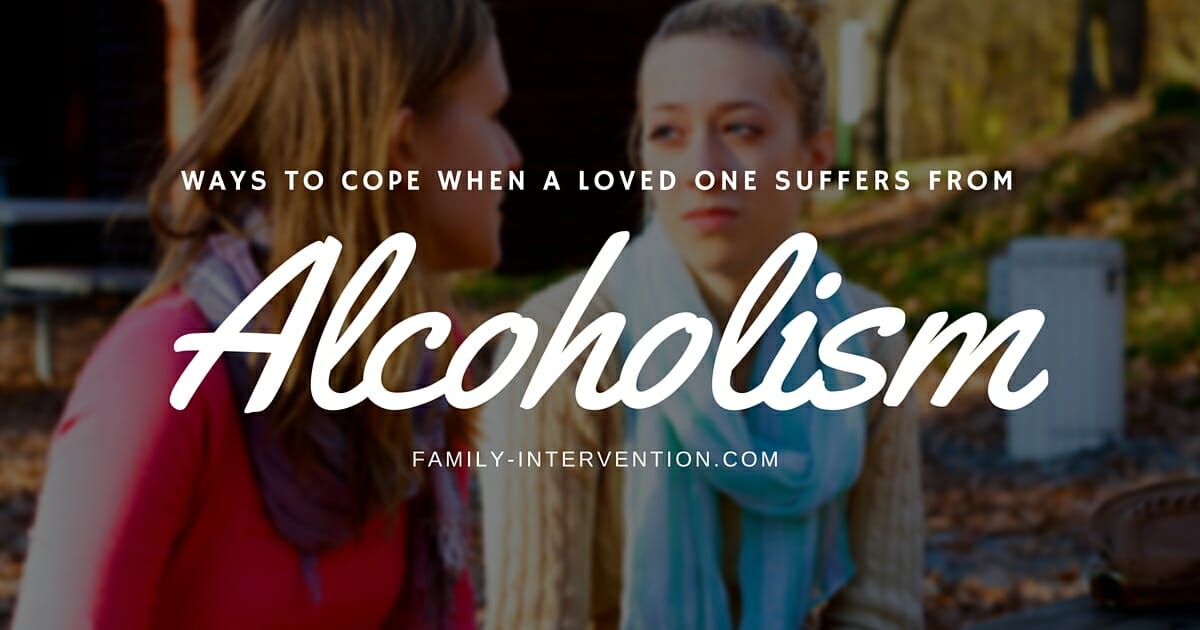Search by category, archive or keyword

Updated: November 4th, 2022
If you’ve had the experience of living with an alcoholic, you know how heartbreaking it can be to watch someone you love slowly destroy themselves with drinking. Like a train wreck in ultra-slow motion, oftentimes, the downward spiral of alcoholism takes years and sometimes decades to play itself out.
The very notion of standing by helplessly as a spouse, family member, or close friend ruins their life one drink at a time is incomprehensible to most people. Yet the compulsive nature of the disease and the impenetrable wall of denial most alcoholics surround themselves with means most rational rules of behavior simply don’t apply.
How can you cope with something so baffling?
Alcoholism – A Family Disease
To understand more about alcoholism, let’s discuss some statistics:
The National Council on Alcoholism and Drug Dependence (NCADD) reports that as an addictive substance, alcohol is the most commonly used and abused drug in the United States.
The statistics are staggering.
The 2019 National Survey on Drug Use and Health found roughly 16 million Americans were heavy alcohol users, and 14.5 million Americans had an alcohol use disorder.
The Denial of Alcoholism
Not long ago, alcoholism was widely misunderstood and considered to be a weakness or a moral failing on the part of the alcoholic. Though there are many uninformed people who still feel this way, the general public perception has changed over the last 20-30 years, and alcoholism is now understood to be a disease.

Much like cancer or diabetes, you don’t blame an individual for having a disease, but you do expect them to go to a doctor and get help. The unique role that denial plays in the disease of alcoholism means the afflicted person – the alcoholic – literally cannot see or comprehend the problem that everyone else so clearly and plainly observes. This sets up an exasperating situation for anyone who finds themselves in the frustrating position of dealing on a day-to-day basis with a loved one who is an alcoholic.
Understand the Role of Denial
How do you cut through denial? The choice, on the part of the alcoholic, refusing to admit to reality is what often infuriates spouses and family members the most. Try to remember that denial is part of the disease, and it’s best not to get upset about something which is out of your control.
How to Effectively Cope When a Loved One Has Alcoholism
First, educate yourself on the disease of alcoholism. Understanding alcoholism is a tall order. There are many excellent books on the subject, and groups such as Al-Anon provide information and meetings to family and friends of alcoholics. Seek help and information online or schedule a visit with a counselor.
Protect Yourself
Sadly, many emergency room doctors will attest to the high number of alcohol-related injuries they treat on a daily basis. If you have the sense that you are in a dangerous situation due to an alcoholic’s temper or abusive behavior, please get help now.
Manage Your Emotions Wisely
The frustration of dealing with an alcoholic’s behavior can often cause anger in spouses or family members. Alcohol and anger are an explosive mix. If you see that the drinking is already underway for the day, it’s best not to engage with the alcoholic. If you feel anger welling up inside of you, you need a strategy to find a healthy way to express that negative emotion. Venting about the alcoholic will only worsen the situation.
Get an Action Plan
Have an action plan and be ready to act. Many times, during a crisis, the alcoholic’s defense mechanisms will come down, and the fog of denial will lift. The alcoholic may connect the dots and see the wreckage that excessive drinking has brought. It’s at a time like this that an alcoholic may be more open to hearing about treatment options.
Effectively Communicate with the Alcoholic
Like navigating a sailboat on a stormy night, you have to keep your eye on the long-term goal of getting the alcoholic into the safe harbor of treatment. Don’t get bogged down in pointless alcoholic arguments or debates. Choose the right moment to discuss the problem, and ideally, speak to the individual in a group setting so that they understand that the problem is something that others see, too.
Seek Professional Help
It can be tempting just to turn a blind eye to the problem of alcoholism and just work around the havoc that the disease is causing in your life. However, it’s important to know that alcoholism is a progressive disease. It’s likely that the problem is only going to get worse over time. This is why your best bet is to try and get your loved one to accept help.
Often, professional treatment is the best approach, and often, it starts with a call to a professional interventionist. With a professional team and a comprehensive program for recovery, your loved one has the best chance for long-term recovery.
Learn more about our family intervention services below.
An intervention is not about how to control the substance user; it is about how to let go of believing you can.
“The most formidable challenge we professionals face is families not accepting our suggested solutions. Rather, they only hear us challenging theirs. Interventions are as much about families letting go of old ideas as they are about being open to new ones. Before a family can do something about the problem, they must stop allowing the problem to persist. These same thoughts and principles apply to your loved one in need of help.”
Mike Loverde, MHS, CIP



